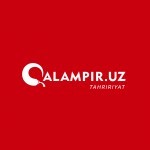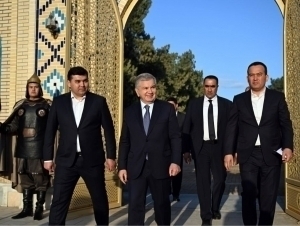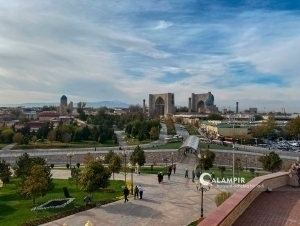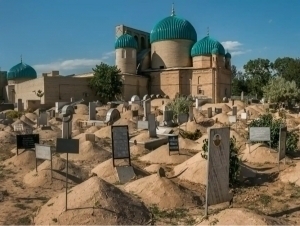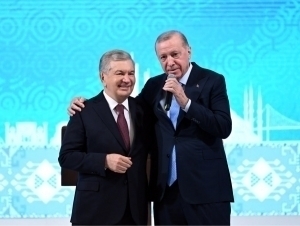АҚШ Ўзбекистонга пул ажратишни тўхтатди, газ ва “свет” нархи ошмайди – Ҳафта таҳлили
Таҳлил
−
30 Март 2025 43992 13 дақиқа
Яна бир Рамазон ойини ортда қолдирдик. Яна бир Ҳайит билан табриклаш бахтига муяссар бўлиб турибмиз. Ва айни кунларда тинчлик, хотиржамлик, соғлик ва бирдамлик, баҳамжиҳатлик нақадар муҳимлигини ҳис этяпмиз. Бу ойда имкон қадар атрофдагиларга ёмон сўз айтишдан, ғийбатдан, туҳматдан, бировнинг ҳақини ейишдан, пора олишдан, мазлумга зулм қилишдан тийилган бўлсак, келгуси ойларда ҳам шундай яшасак, шундай яшай олсак эди.
1 апрелдан электр ва газ нархи оширилмайди
Суюнчи беринг! 1 апрелдан электр ва газ нархи оширилмайдиган бўлди. Лекин жуда хурсанд ҳам бўлиб кетманг. Нарх ошиши бор-йўғи 1 ойга, яъни 1 майгача кечиктирилди, холос.
Президент Шавкат Мирзиёев Вазирлар Маҳкамасига электр энергияси ва газ бўйича янги тарифларнинг кучга кириш муддатини кечиктириш бўйича топшириқ берди. Бу қарордан мақсад иқтисодиёт тармоқлари ва тадбиркорлик субъектларини ёқилғи-энергетика ресурслари билан ишончли тарзда таъминлаш, шунингдек, аҳоли ва тадбиркорлик субъектларини қўллаб-қувватлаш экани айтилган.
Энергетика вазирлигининг маълум қилишича, агар электр ва табиий газ учун тўлов олдиндан амалга оширилса, эски тарифлар икки ойгача амал қилишда давом этади.
Президент 26 март куни энергия ресурсларини иқтисод қилиш, истеъмол самарадорлигини ошириш ҳамда улардан оқилона фойдаланиш бўйича йиғилиш ўтказди.
Ўзбекистон учун бу айни кунда долзарб масала. Ҳукумат эҳтимолларига кўра, 2030 йилга бориб, мамлакат аҳолиси 41 миллионга етиши, энергия ресурсларига бўлган талаб ҳозиргидан 1,5 карра ошиши кутилмоқда. Шулардан келиб чиққан ҳолда, Президент масъулларга табиий газ ва электрни иқтисод қилиш бўйича топшириқ берди. Жорий йилда 1,1 миллиард куб метр табиий газ ва 2,6 миллиард киловатт соат электрни иқтисод қилиш режа қилинди.
Бунинг учун биринчи навбатда, йирик саноат корхоналарида замонавий тежамкор ускуналар ўрнатиш, энергия исрофини камайтириш зарур. Ҳукумат бу соҳада янгича ижро ва назорат тизимида ишлаши керак.
Энергетика вазирлигига кўра, 2024 йилда мамлакатда 81,5 миллиард киловатт соат электр энергияси ишлаб чиқарилган ва бу 2016 йилга нисбатан 38 фоизга кўпдир. Истеъмолчиларга 67,5 миллиард киловатт⋅соат электр энергияси етказиб берилган. Бу эса 2016 йилга нисбатан 48 фоизга кўп дегани. Бироқ муаммолар ҳал бўлгани йўқ. Аксинча, ўтган йилларда нафақат чекка туманлар, балки пойтахтда ҳам электр энергияси ва газ билан боғлиқ муаммолар ортгандан ортди, пойтахтда газ ва электр энергиясидан узилишлар кўпайди. Ҳудудларда табиий газ ва электр энергияси танқислигидан ёзғириши ортган бир вақтда, расмийлар, жумладан депутатларнинг энергия ресурсларини тежаш ҳақидаги баёнотлари пайдо бўла бошлади. Хусусан, депутат Алишер Қодиров бу йил қиш чилласида газни уй иситиш ва овқат пиширишга ишлатиб юборадиган халқнинг косаси оқармайди деган гаплари учун ижтимоий тармоқда сазойи қилинганди.
Хўш, сиз яшаётган ҳудудда газ ва “свет”дан муаммо йўқми? Даромадингизнинг қанчасини электр ва газга тўлаяпсиз? Тўғрироғи, газ ва “свет” учун ойига қанча тўлаяпсиз. Бу ҳақда изоҳларда ёзиб қолдиринг.
“Тонировка” борасида яна ўзгаришлар бўлади
Ажойиб даврда яшаяпмиз-да! Автомобилларга “тонировка” қилиш, яъни ойнаси тусини ўзгартиришнинг давлат томонидан белгиланган нархи БҲМнинг 10 бараварини, айни кунда 3 миллион 750 минг сўмни ташкил этади. Лекин тонировка учун жарима 1,5 ярим баравар қиммат, яъни БҲМнинг 25 баравари бўлиб, 9 миллион 375 мингга тўғри келади. Бу гадони туянинг устида ит қопиши эмасми? Ҳа, майли, бу гапни бироз четга суриб турай. Келаси ой “тонировка” борасида яна яхши янгилик бўлиши кутилмоқда.
Рухсатномада кўрсатилган талабларни бузган ҳолда ойналарни қорайтирган ҳайдовчиларга БҲМнинг бир баравари, яъни 375 минг сўм миқдорида жарима белгиланиши мумкин. Бу ҳақда шу ҳафта Ички ишлар вазирлиги томонидан муҳокамага қўйилган “Ўзбекистон Республикасининг Маъмурий жавобгарлик тўғрисидаги кодексига ўзгартириш ва қўшимчалар киритиш тўғрисида”ги қонун лойиҳасида айтилган.
Маъмурий жавобгарлик тўғрисидаги кодексга ушбу қоидани назарда тутувчи 1261-моддаси киритилмоқда.
Хўш, бу нимани англатади. Айтайлик, сиз “тонировка” учун рухсатнома олгансиз ва унда олд ойнанинг туси қуёш ўтувчанлиги 50 фоиз бўлиши керак деб белгиланган. Сиз бу талабни менсимай қуёш ўтувчанлигини 30 фоизга қисқартирдингиз ёки боринг яна тўлиқ қорайтирдингиз. Бундай ҳолатда амалда Маъмурий жавобгарлик тўғрисидаги кодекснинг 126-моддаси қўлланилиб, БҲМнинг 25 баравари (9 млн 375 минг сўм) миқдорида жарима белгилаб келинаётган эди. Яъни рухсатномаси бор-у фақат “тонировка”си миқдори белгиланганидан ошиб кетган билан “тонировка” учун умуман рухсатномаси йўқларни ажратувчи адолатли мезон йўқ эди. Энди рухсатномаси бўла туриб, ойнаси кўпроқ қорайтирилганлар БҲМнинг бир баравари миқдорида жарима тўлаши белгиланиб, адолат тикланмоқда.
Шунингдек, муҳокамага қўйилган қонун лойиҳаси билан Маъмурий жавобгарлик тўғрисидаги кодекснинг 332-моддаси 2-қисмида назарда тутилган – йўл ҳаракати қоидаларини бузганлик учун солинган жаримани ҳуқуқбузар жарима солиш тўғрисидаги қарор чиқарилган кундан эътиборан 60 кун эмас, 90 кундан кечиктирмай тўлаши лозимлиги белгиланмоқда.
Ушбу қонун лойиҳаси муҳокамаси жорий йилнинг 11 апрелигача давом этади.
Шавкат Мирзиёев бошчилигида ифторлик маросими ўтказилди
2017 йилдан буён Ўзбекистонда Президент Шавкат Мирзиёев бошчилигида Ҳукумат ифторлик маросимларини ўтказиш одат тусига айланган. Галдаги ифторлик давлат раҳбари бошчилигида Қадр кечаси арафасида – 25 март куни ўтказилди. Шу куни барча ҳудудларда эҳсон дастурхонлари ёзилди. Президент Шавкат Мирзиёев Кўксарой қароргоҳида ташкил этилган маросимда қатнашди.
Фаоллар, қариялар, парламент аъзолари, мусулмонлар идораси раҳбари, хорижий мамлакатлари элчилари иштирок этган маросимда давлат раҳбари нутқ сўзлаб, Ислом динининг инсонпарварлик моҳиятини чуқур ўрганиш, Ўзбекистонда буюк тарих ва маданият дурдоналарини, улуғ алломаларнинг бой меросини тўплаш ва кенг тарғиб этишга алоҳида эътибор қаратилаётганини урғулади.
Самарқандда Имом Бухорий мажмуасида 10 минг кишилик масжид бунёд этилаётгани, у жорий йилда очилиши айтилди.
Президент дунёдаги вазиятга ҳам тўхталиб ўтди. Аксарият зиддият ва можаролар айнан Ислом дунёсида содир бўлаётганини афсус билан қайд этди.
Нотинчлик ўчоқлари исталган пайтда кенгайиб кетиши мумкинлиги, мусулмон мамлакатларида тинчлик ва барқарорликни таъминлаш учун бирдамлик ва ислом уммати ҳамжиҳатлигини янада мустаҳкамлаш ҳар қачонгидан ҳам долзарб эканини айтди.
Бунинг учун, биринчи навбатда, ёшларни ёт ғоялар таъсиридан сақлаш, илм-маърифатга йўналтириш эътибор марказида туриши керак.
Маросимда Қуръони карим оятларидан тиловат қилинди. Аллоҳ таолодан бутун дунёда тинчлик, юртда фаровонлик, меҳр-оқибат барқарор бўлишини сўраб, дуолар ўқилди. Мусулмонлар идораси раиси – муфтий Нуриддин Холиқназаров дуога қўл очиб, Президентга узоқ умр тилаб, унинг ота-онаси ҳаққига ҳам дуо қилди.
“Мустақилликнинг 25 йиллиги” газ конида яна фожиа бўлдими?
Сурхондарё вилояти Бойсун туманидаги “Мустақилликнинг 25 йиллиги” газ конида яна портлаш юз берди. Навбатдаги портлаш коннинг аввал авария содир бўлган қисмида эмас, янги бурғиланган қудуқда юзага келган.
Энергетика вазирлиги ҳолатга портлаш эмас, М-25 газ конидаги 202-сонли қудуқда водород сульфидининг назорат остидаги отилиши дея таъриф берган. Табиатга зиён етказмаслик ва ҳаво ифлосланишининг олдини олиш мақсадида қудуқ ёқиб қўйилгани изоҳланган.
Вазирликнинг маълум қилишича, ҳодиса оқибатида ҳеч ким жабрланмаган.
“Алоҳида таъкидлаш лозимки, юзага келган мазкур ҳолат аҳоли ва яқин атрофдаги ҳудудларга ҳеч қандай хавф туғдирмайди. Жараён Фавқулодда вазиятлар вазирлиги, “Саноатконтехназорат” давлат инспекцияси ҳамда Очиқ нефть ва газ фаввораларнинг олдини олиш ва бартараф этиш бўйича Ўзбекистон ҳарбийлаштирилган қисми мутахассислари томонидан тўлиқ назорат остига олинган”, дейилади хабарда.
Бу биринчиси эмас. Бундан 6 ой олдин, 2024 йилнинг аниқроғи сентябрь ойи бошида “Мустақилликнинг 25 йиллиги” конида олтингугурт гази ёки илмий тилда водород сульфид сизиб чиқиши кузатилган. Ўшанда бу ҳодисага технологик жараён бузилиши сабаб бўлгани айтилган.
Водород сульфид – бевосита асаб тизимига таъсир қилувчи заҳарли газ ҳисобланади. У ҳид билиш нервини фалаж қилиш хусусиятига эга, бунинг оқибатида одам бу газнинг ҳидини сезмай қолади. Кам миқдордаги водород сульфиди бўлган ҳаводан нафас олиш бош айланиши, бош оғриғи, кўнгил айниши, қайт қилишга, юқори концентрация эса кома, тутқаноқ, ўпка шиши ва ўлимга олиб келиши мумкин.
Рамазон ҳайити муносабати билан 488 нафар маҳкум афв қилинди
Ўзбекистонда ҳар йилги анъанага содиқ қолинган ҳолда Рамазон ҳайити муносабати билан 488 нафар маҳкум афв қилинди. Давлат раҳбари “Жазо муддатини ўтаётган, қилмишига чин кўнгилдан пушаймон бўлган ва тузалиш йўлига қатъий ўтган бир гуруҳ шахсларни афв этиш тўғрисида”ги фармонни имзолади.
Қайд этилишича, афв этилган шахсларнинг 100 нафари асосий жазодан тўлиқ озод этилган, 268 нафари жазони ўташдан муддатидан илгари шартли озод қилинган, 34 нафарининг озодликдан маҳрум этиш жазоси енгилроқ жазо билан алмаштирилган. Шунингдек, 86 нафар шахсларга тайинланган озодликдан маҳрум этиш жазосининг муддатлари қисқартирилган.
Афв этилганларнинг 17 нафарини чет эл фуқаролари, 37 нафарини аёл, 37 нафарини 60 ёшдан ошган эркаклар, 167 нафарини ёшлар (шулардан, 1 нафари вояга етмаган) ҳамда 5 нафарини тақиқланган ташкилотлар фаолиятида қатнашган шахслар ташкил этади.
Ўзбекистонда Президент фармони билан афв этиш, инсоний кўрсатиш анъанага айланган бир пайтда тергов изоляторларидан одамларнинг ўлиги чиқиши, маҳкумлар қийноққа солиниши билан боғлиқ ҳолатлар камаймаяпти. Шу ҳафта Тошкент вилояти Пискент туманида жойлашган 50-сон манзил-колонияда жазо муддатини ўтаётган маҳкум колония ходимлари томонидан қийноққа солиниб, сўнг асоссиз равишда интизомий бўлинмага жойлаштирилгани маълум бўлди. Бу ҳақда у Олий Мажлиснинг Инсон ҳуқуқлари бўйича вакили (омбудсман)га мурожаат қилган.
Омбудсманга кўра, мазкур ҳолат жойига чиқиб ўрганилганда, маҳкум Пискент тумани марказий шифохонасига жойлаштирилган ҳамда шифокорлар хулосасига кўра, унинг бош ва кўкрак қисмида лат ейиш аломатлари аниқланган.
“Ишга оид ҳужжатлар ўрганилганда, маҳкум Т.И. интизомий бўлинмага 2025 йил 27 февраль куни жойлаштирилган ва уни 10 суткага интизомий бўлинмага киритиб қўйиш ҳақида қарор қабул қилинган. Ушбу қарор Тошкент махсус прокурори томонидан ўрганилиб, бекор қилинган ҳамда колония маъмуриятининг ҳаракатлари Жиноят-ижроия кодексининг 105-моддаси (маҳкумларни интизомий жазолаш шартлари) ва 111-моддаси (қўпол тартиббузарлик тушунчаси) талабларига зид деб топилган”, дейилади хабарда.
Билдирилишича, маҳкум олти кун давомида асоссиз равишда интизомий бўлинмада сақланиб, унинг ҳуқуқлари ва эркинликлари бузилган. Шу сабабли, Омбудсман қонун талаблари бузилишига йўл қўйган ходимларга чора кўрилишини сўраб Бош прокуратурага назорат хати киритган.
Фавқулодда вазиятлар ходими пора билан қўлга тушди
Тошкент шаҳар Фавқулодда вазиятлар бошқармаси бошлиғи ўринбосари пора билан қўлга тушди. Қайд этилишича, унинг қилмишлари Коррупцияга қарши курашиш доирасида Давлат хавфсизлик хизмати органлари томонидан олиб борилган тезкор-қидирув тадбирлари давомида фош қилинган.
У ўз хизмат мавқеини суиистеъмол қилиб, Тошкент шаҳрида қурилиши режалаштирилган биноларнинг эскиз лойиҳасини тасдиқлаш, ёнғиндан автоматик тарзда хабар берувчи қурилмалар бўйича тузилган далолатномаларни имзолаш ҳамда янги қурилган ёки реконструкция қилинган биноларни Давлат қабул комиссиясига фойдаланишга топширилишида ижобий хулоса бериш эвазига доимий равишда тамагирлик йўли билан пора олиб келгани айтилмоқда.
Билдирилишича, бундай объектлар ичида умумий ўрта таълим мактаби ва тиббиёт муассасаси бинолари ҳам бор.
Ҳозирда унга нисбатан Жиноят кодексининг тегишли моддалари билан жиноят иши қўзғатилиб, қамоққа олиш тарзидаги эҳтиёт чораси қўлланилган. Дастлабки тергов ҳаракатлари олиб борилмоқда. Бироқ ДХХ пора миқдори, порахўрнинг шахси ва жиноят иши моддаларига аниқлик киритмаган.
Оммавий тартибсизликларга оид қўшимча жавобгарлик белгиланди
Ўзбекистонда оммавий тартибсизликлар содир этиш мақсадида ўқувдан ўтганлик учун жавобгарлик белгиланди. Тугаётган ҳафтада қабул қилинган “Жиноят кодексининг 244-моддасига ўзгартириш киритиш тўғрисида”ги Ўзбекистон Республикаси қонуни билан Жиноят кодексига ўзгартириш киритилди.
Унга кўра, кодексга оммавий тартибсизликлар содир этиш мақсадида ўқувдан ўтганлик ҳамда ушбу фаолиятни молиялаштирганлик учун жавобгарликни белгиловчи ўзгартириш киритиш назарда тутилмоқда.
Қонунга кўра, шахснинг оммавий тартибсизликлар содир этиш мақсадида ўқувдан ўтиши, шу жумладан оммавий тартибсизликларни содир этиш билимини, амалий маҳоратини ва кўникмаларини эгаллаши, ўқув чоғида қурол-яроғ, портлатиш қурилмалари, портловчи, заҳарловчи, атрофдагилар учун хавф туғдирадиган бошқа моддалар ва буюмлар билан муомала қилиш усулларини ўрганиши:
БҲМнинг 300 бараваридан 600 бараваригача миқдорда жарима ёки 3 йилгача ахлоқ тузатиш ишлари ёхуд 5 йилдан 7 йилгача озодликдан маҳрум қилиш билан жазоланиши белгиланди.
Шунингдек, ушбу жиноятни содир этган шахс, агар у ўқувдан ўтгани тўғрисида ҳокимият органларига ихтиёрий равишда хабар қилса, содир этилган жиноятни фош қилишга ёки бундай ўқувдан ўтган, ўқувни амалга оширган, ташкил этган ёхуд молиялаштирган бошқа шахсларни, шунингдек, ўқув ўтказилган жойни аниқлашга фаол кўмаклашса ва агар унинг ҳаракатларида жиноятнинг бошқа таркиби мавжуд бўлмаса, жиноий жавобгарликдан озод қилиниши белгиланди.
Маълумот учун, Жиноят кодексининг амалдаги 244-моддасида оммавий тартибсизликларга даъват қилиш, қурол қўллаб ҳокимият вакилига қаршилик кўрсатиш ва шу каби бошқа ҳуқуқбузарликлар учун БҲМнинг 300 баравари миқдоридаги жаримадан 15 йил озодликдан маҳрум қилишгача бўлган жазолар назарда тутилган.
АҚШ Ўзбекистон пахта саноатига бошқа пул ажратмаслигини эълон қилди
Америка Қўшма Штатлари Меҳнат департаменти Ўзбекистон пахта саноатида “шаффофликни ошириш” учун ажратилган миллионлаб доллар пул бошқа ажратилмаслигини эълон қилди. Бу ҳақда АҚШ Меҳнат вазири Лори Чавес-Деремер ижтимоий тармоқдаги саҳифасида тегишли видеомурожаатини эълон қилди.
У ўзининг видео нутқида АҚШ охирги дастурларга 38 миллион доллардан кўпроқ маблағ ажратгани ва бундан ҳатто америкалик солиқ тўловчиларнинг хабари бўлмаганидан ёзғирди.
“Ўтган ҳафта департамент 38 миллион доллардан кўпроқ маблағни тежаб, бир нечта хорижий ёрдам грантларини тўхтатди. Ишончим комилки, сиз машаққат билан ишлаб топган солиқ пулларингиз Ўзбекистон пахта саноатида шаффофлик ва жавобгарликни ошириш, Бразилия ва Колумбияда иқлим ўзгариши бўйича дастурлар билан боғлиқ сиёсатни илгари суриш, Индонезия ва Гватемалада жамоавий битимларни қўллаб-қувватлаш, Конго Демократик Республикасида меҳнат стандартлари бўйича тараққиётни назорат қилиш каби ишларга сарфланаётганини ҳам билмас эдингиз”, деди Лори Чавес-Деремер
Шу сабабли Меҳнат вазири АҚШ Президенти Дональд Трамп илгари сураётган сиёсатни қўллаб-қувватлаб, ортиқ бошқа мамлакатларнинг “боши силанмаслигини” билдирган.
“Биринчи кундан мен америкалик ишчиларни биринчи ўринга қўйиш Меҳнат департаментида бизнинг устувор вазифамиз бўлишига ваъда бердим. Президент Трампнинг кўрсатмаси билан биз ўз вазифамизни бажаришда вақтни беҳуда сарфламадик. Оддий қилиб айтганда, биз Американи охирги ўринга қўядиган дастурларни йўқ қиляпмиз. Мен Меҳнат департаментидаги жамоамга пулингизни тежаш учун кўпроқ имкониятларни аниқлашни буюрдим. Мен исрофгарчилик, фирибгарлик ва суиистеъмоллардан холос бўлиш орқали америкалик ишчини биринчи ўринга қўйиш учун курашишда давом этаман ва бу долларларни ишчи кучимизга қайтарилишини таъминлайман”, дея ваъда берди АҚШ Меҳнат вазири.
Ёдингизда бўлса, АҚШнинг янги Президенти Дональд Трамп ҳокимият тепасига келгач, Халқаро тараққиёт агентлиги (USAID) дастурларининг 83 фоизини расман тўхтатиб қўйди. Мамлакатда ташкилотнинг ёпилиши бўйича агентлик ва Трамп маъмурияти ўртасида муросасизлик давом этмоқда. Яқиндагина АҚШнинг Мэриленд штати федерал судьяси Теодор Чуанг иш материалларини кўриб чиққач, АҚШ Халқаро тараққиёт агентлиги (USAID) фаолиятининг тўхтатилиши ноқонуний экани ҳақида хулоса чиқарди ва агентликнинг ишини тиклаш бўйича қарор қабул қилди. Аммо бу ҳали ҳаммаси тугаганини англатмайди.
USAID Ўзбекистон Ҳукуматига кўп йиллардан буён турли лойиҳалар, хусусан қишлоқ хўжалиги, соғлиқни сақлаш, экология ва ичимлик суви муаммолари, аёлларни иш билан таъминлаш, бизнесни ривожлантириш бўйича қатор лойиҳаларни молиявий қўллаб-қувватлаб келар эди.
Ёдингизда бўлса, Президент Шавкат Мирзиёевнинг жорий йил 11-13 март кунлари Францияга амалга оширган ташрифи доирасида уран бўйича келишувлар имзоланганди. Тугаётган ҳафтада эса Ўзбекистон бир йил давомида Францияга уран етказиб бериш учун Қозоғистон компанияси билан шартнома имзолади.
Қайд этилишича, Қозоғистон компанияси 500 контейнер уран концентратини Санкт-Петербург орқали Францияга етказиб беради. Ташиш Санкт-Петербург портидан юк жўнатилган кундан бошлаб 15 кун мобайнида амалга оширилиши лозим.
Шартнома учун дастлабки нарх 11 миллион еврони ташкил этган. Кейинчалик мазкур сумма камайтирилган. Уран 2026 йилнинг биринчи чораги охиригача ташилади.
Live
Барчаси